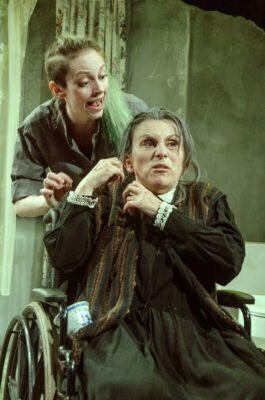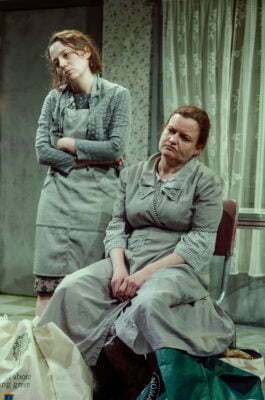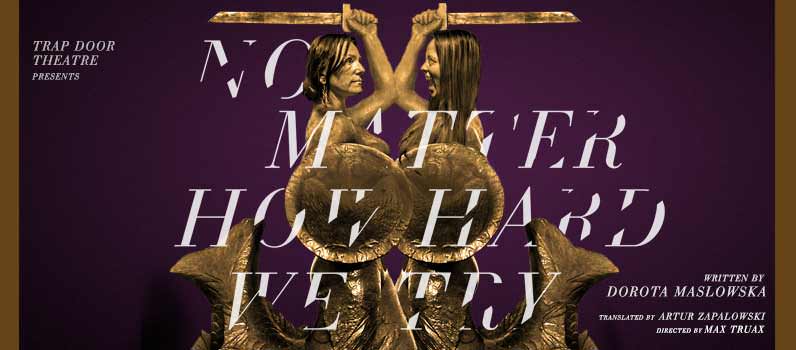No Matter How Hard We Try
 By Dorota Masłowska
By Dorota Masłowska
Translated by Artur Zapałowski
Directed by Max Truax
Produced by Trap Door Theatre, Chicago
Black Comedy in Post-Modern Poland
Don DeLillo’s post-modernist novel White Noise is made up largely of lists of consumable products Americans obsess over, in DeLillo’s opinion, to distract ourselves from our fear of death. In young Polish author Dorota Masłowska’s 2008 play No Matter How Hard We Try, Or, We Can Exist on the Best Terms We Can, characters take stock of their meager, disgusting possessions and materialistic aspirations in increasingly vain attempts to convince themselves that they care about living. But Masłowska’s play is no mere joyless slog through a post-Communist hell. Director Max Truax’s heavily choreographed direction keeps the play visually interesting, while his ensemble delivers black humor with wicked wit. The result is a harrowing examination of modern Poland, which is all the more alarming for how easily we can recognize our own lives in it.

As is traditional for Trap Door productions, we are introduced to the characters through a silent scene before the lights go down, while the audience is taking their seats. In this case, set designer Joanna Iwanicka has envisioned a crumbling grey apartment with a toilet in the corner. Sickly greenish wallpaper and curtains evidence an effort long-ago to make it habitable, but now it’s a soul-crushing, degrading environment made even more oppressive by Richard Norwood’s unflattering lighting. Before a flickering old television set, the teenage Little Metal Girl (Emily Nichelson) amuses herself by balancing empty yogurt tubs on her sleeping grandmother, the Gloomy Old Biddy (Marzena Bukowska). The old woman collects these tubs for the day when World War II comes back; that way, she’ll be ready with plenty of preserved “food.”
The girls’ mother, Halina (Tiffany Bedwell), is displeased that the Gloomy Old Biddy has not been fed today, but that’s normal. Between her tiresome Romanization of pre-war Poland and her senility, the grandmother is a constant source of irritation, and the Little Metal Girl does not deal with stress well. “Go to your non-existent room!” her mother shouts, as part of a little joke that also includes their non-existent futures and self-respect. When the girl asks what’s for dinner, the mother replies they’re having dried snatch with vinegar. Later, a self-loathing neighbor, Bozena (Artistic Director Beata Pilch), shows up babbling about how fat, ugly, and worthless she is, perhaps as part of a failed effort to get someone to contradict her. The family’s only solace comes from “Not for You” magazine and watching TV, on which they see how miserable, but amusing, their celebrities are.

Though the household is small, the play has a large ensemble. That’s because, while the play doesn’t have much of a plot, it does contain a large number of stories, which build on and play off of each other. Michael Garvey plays a film director desperate to gain international recognition through documenting life’s grimness, and whose depictions of implicitly gay characters always evoke a horrified shudder from his backwards countrymen despite how tepidly he dances around the subject (there may be a bit of the author in him). Through his narratives, the family views and participates in a wide range of dysfunction, which includes their idolization of a jittery drug-addicted actor (Johnny Graff) and a condescending, useless society lady (Simina Contras). These scenes are as much an exercise Truax’s heavily dance-inspired style as they are a demonstration of translator Artur Zapałowski’s ear for capturing appropriate English idioms. The intensity of the actor’s thrashing builds and slackens as their characters approach and retreat from self-awareness and truth, maintaining an overwhelming atmosphere of confinement and agitation on the small stage.

Trap Door’s core audience is likely to be familiar with the travails of the former Eastern Bloc; how de-communization resulted in the theft of nation’s wealth by corrupt oligarchs and the dreams of the younger generation largely revolve around immigration and integration into Western Europe. Those not as well-informed about contemporary Poland or the style of post-modernism will feel more challenged by No Matter How Hard We Try, but I think they’ll still get a lot out of it if they approach it with curiosity and don’t demand that everything make sense to them in the moment. A large theme of the play is how, despite the Little Metal Girl’s resistance to being mired in the past, World War II still casts a long shadow. Black humor, such as this play’s, is a way of grappling with that legacy, and the play takes several shots at the conservative Catholic Kaczyński twins for making Poland what it is in an attempt to restore it to the time of Józef Piłsudski. But with the country currently in political crisis as the party they founded and the Constitutional Court compete for power, Masłowska’s determination to cut through nationalist mythology and uncover what truly ails people is more prescient than ever.
Recommended
Jacob Davis
Playing at Trap Door Theatre, 1655 W Cortland Ace, Chicago. Tickets are $20-25 with two-for-one admission on Fridays; to order, call 773-384-0494 or visit trapdoortheatre.com. Performances are Thursdays-Saturdays at 8:00 pm. Running time is ninety minutes with no intermission.

